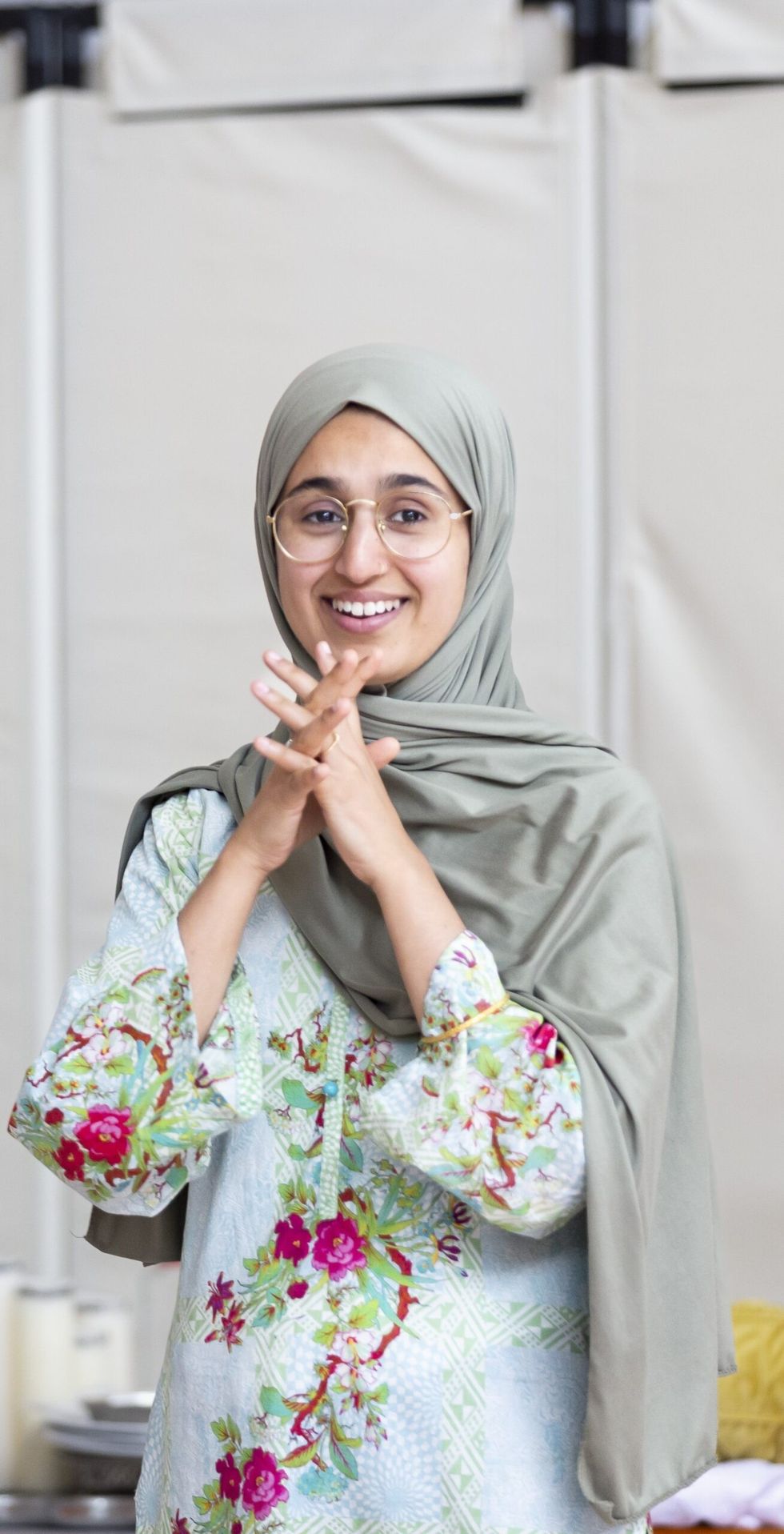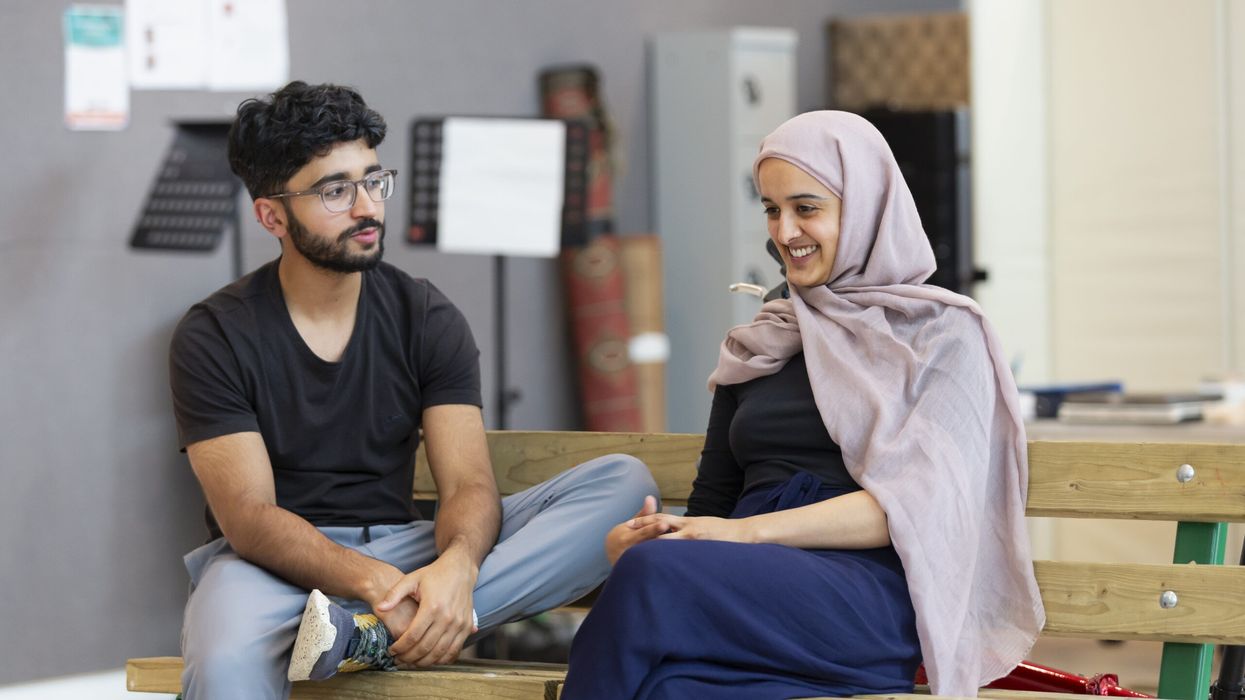THE poster for the Kiln Theatre’s Peanut Butter & Blueberries is striking, with a young south Asian couple cheekily gazing at each other sat on a bench with the London skyline in the background.
Having two Asian leads in a play is a rarity, what’s rarer is the female lead wearing a hijab.
Author, poet and educator Suhaiymah Manzoor-Khan’s debut play explores the love between two young people when they feel weight of the world on their shoulders.
Peanut Butter & Blueberries is about Bilal (Usaamah Ibraheem Hussain) and Hafsah (Humera Syed) who leave their hometowns of Bradford and Birmingham, respectively, to study in London. They find common ground over a peanut butter and blueberry sandwich, but as their connection grows, their pasts and social realities become harder to ignore.
“It’s just a Muslim story, which I don’t think really has been seen on stage,” Hussain told Eastern Eye.
“It’s also about the hurdles and obstacles in the way of initially, their friendship, and then their love, and how they navigate through these things from their own community and from outside, as well. They face issues that will resonate with a lot of Muslims and, I hope, south Asians, as well.”
Syed said the play tries to make the characters relatable to the audience by not making their Muslim identity the focus of the story.
“We’re not trying to shy away from the fact that they’re both practising Muslim characters, but we’re also not trying to make a point of the fact that they’re both Muslims – it’s a love story and the characters happen to be Muslims.
“All the hurdles they have to go through, anyone would have to go through them, Muslims and non-Muslims.”
Asked about the religious and cultural taboo of unmarried men and women being in a relationship, Hussain said: “It does touch on that, briefly, about what guys and girls in our communities are taught from a young age in respect to what we can get away with and the things we can’t get away with.”
Nida Manzoor’s ground-breaking series, We Are Lady Parts, has challenged the stigma around Muslim women covering their faces. The Bafta-winning show about an all-Muslim female punk rock band has lead characters who wear the hijab and niqab.
“We need to challenge the stereotype that men force women to wear the headscarf – which is not the case,” said Syed.

“It’s important for people to see themselves represented on stage and on screen. Growing up in a country where there’s so much Islamophobia, racism, and all kinds of prejudices, it’s important to show there’s no reason why you can’t portray a Muslim woman wearing a headscarf on stage or on screen.”
Hussain and Syed said both their characters are complex and struggle with identity and finding a place for themselves in society.
“From my character’s perspective, it’s an analysis of a brown man’s struggles in certain parts of this country, coming from a certain background and that feeling of being trapped and not being able to escape,” said Hussain.
“The pressures of being an Asian man in the UK, having to look after your family, trying to fit into the expectations within your culture, but also the need to want to try and fit in with people at university who are mainly white.
“It does speak very accurately about the issues that some south Asian men, especially from working class background, face.”
On Hafsah, Syed said: “She carries a lot of the weight of the world on her shoulders, because she knows about current affairs. She’s very diligent in making sure that she’s aware of the weight of being a young Muslim person in this country.
“When you’re aware and empathise with other people’s pain, they affect you in lots of different ways – physically, emotionally, mentally; I think a lot of young people feel like that, at the moment.”
Several contemporary issues like Brexit, immigration, the Israel-Palestine war and controversial political rhetoric have led to divisions within communities in the UK.
Hussain said using the arts to tell stories from different communities can lead to greater understanding and co-operation between groups. “My sense of community is very discombobulated, I don’t feel like we have a cohesive community at the minute – it feels like everyone’s separated,” he added.
“The theatre, by telling these stories, it has the ability and to bring people together, to help us understand one another better, even within our own community.”

The play doesn’t shy away from addressing challenging accusations that certain south Asian communities are insular, or that some migrants don’t acclimatise to British society.
In Peanut Butter & Blueberries, Bilal and Hafsah grow up in tight-knit south Asian communities.
So when they come to study at London’s SOAS University, they gravitate towards each other, because they feel comfortable being around people from their own culture.
“As humans, we all want to belong, be with the people we feel safe and comfortable with, whether that’s considered insular or not,” said Hussain.
“The term insular has negative connotations. Everyone is insular in some respects – whether you’re white, black, brown, east Asian etc, you feel comfortable around your people because they are more accepting of you, because they understand your struggle.
“In my own family, the elders hold on tight to their culture and their religion, because in the past they haven’t felt comfortable mixing with certain groups, because those groups will not be accepting of their views or their traditions.
“It felt like a bit of an attack sometimes. So, of course, you’re going want to protect what’s yours and that’s what causes us to be insular, to some extent.”
Syed added that some of the outreach and community cohesion work that south Asians do often goes under the radar and is rarely acknowledged. “There are insular elements to communities, but there’s a lot of outreach as well,” she said.
“You see mosques really making sure to branch out, offering initiatives like food banks or opening their doors to people who are not Muslim.
“Community does not always have to mean coming from the same place or from the same background, it can be a mixture of different cultures and religions.”
The production team and cast comprise a diverse, talented and inclusive group.
The Kiln have also actively tried to make the show welcoming for a diverse audience.
During the run of Peanut Butter & Blueberries, there will be prayer spaces available on the premises for audiences to use, with the show purposefully ending throughout its run just before the maghrib (evening) prayers.
“The building as a whole is a very accommodating and welcoming space - there’s always different communities in here,” said Hussain.
“They’re always working with the local community, especially the young kids. They’ve spoken to the Kilburn Islamic Centre for people to come and watch the play. There are posters in local restaurants and corner shops.
“They want people from these communities to come and watch the play. I can’t say that about every theatre, but it feels very inclusive nd special. It’s a step in the right direction.”
Peanut Butter & Blueberries is on at the Kiln Theatre till August 31




